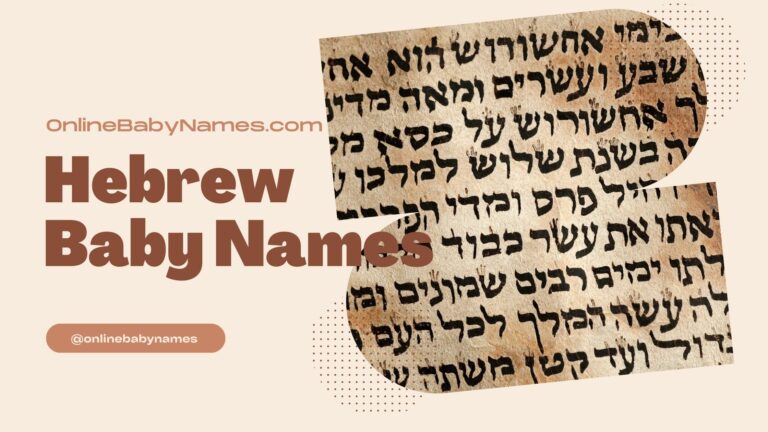
Choosing the perfect name for your baby can be an exciting yet challenging task. Among the myriad of choices available, Hebrew baby names often stand out as meaningful and beautiful options for new parents. With a rich history and cultural significance, these names can provide your child with a unique identity that reflects both their heritage and personal story, as well as your own.
Hebrew names are deeply rooted in ancient tradition and many hold significant spiritual connotations. Often centered on themes such as strength, protection, and faith, these names serve as an inspirational reminder of what’s truly important in life. By selecting a name of Hebrew origin, you’re not only bestowing a timeless and distinctive name unto your child, but also encouraging them to carry on this cherished legacy.
Selecting a Hebrew name for your baby allows you to express your values and beliefs while keeping alive a time-honored custom. In this article, I’ll be exploring some charming and enduring Hebrew names, highlighting their meanings and backgrounds, to help guide you in finding the name that perfectly suits the newest addition to your family.
The Rich History of Hebrew Baby Names
I always find it fascinating to explore the origins and meanings of baby names. Hebrew baby names are no exception, with a rich history that dates back thousands of years. These names have been influenced by various factors such as religion, culture, and geographic locations, all of which have contributed to their popularity and uniqueness.
Hebrew names can generally be traced back to the Biblical era. In fact, many of them come directly from the Old Testament, which is revered by both Judaism and Christianity. Some of the most recognizable Hebrew baby names include:
- Avraham (Abraham), the father of the Jewish people
- Yaakov (Jacob), the founder of the twelve tribes of Israel
- Moshe (Moses), who led the Israelites out of Egypt
- Dovid (David), Israel’s legendary king
These names not only reflect timeless characters from ancient history but also carry significant meanings. For instance, Avraham conveys the idea of being a “father of many nations,” while Yaakov signifies “holding on to the heel” – an expression for overcoming obstacles in life.
As time passed, Hebrew baby names continued to evolve, adapting to changing linguistic and cultural contexts. The Middle Ages saw the introduction of new names like Chana (Hannah) and Ruth, which gained popularity among Jewish families worldwide. Additionally, many Jewish families adopted names with local significance, such as those inspired by local plants, animals, or occupations.
In contemporary times, Hebrew names have experienced a resurgence in popularity, both in Israel and the Jewish Diaspora. These modern names are often inspired by the vast spectrum of Hebrew language, including:
- Amitai, which means “truthful” or “sincere”
- Noam, signifying “pleasantness” or “charm”
- Tal, translating to “dew” or “morning dew”
- Yael, symbolizing “mountain goat” or “to ascend”
Some Hebrew names today also reflect popular culture influences. For example, Gal (as in actress Gal Gadot) means “wave,” while Bar (like supermodel Bar Refaeli) translates to “wild” or “untamed.”
To sum it up, Hebrew baby names boast both a profound history and versatile meanings. These names have evolved through time, adapting to diverse cultural and geographic influences while maintaining their relevance and appeal. Whether you’re considering a classic biblical name or a modern Hebrew moniker, you’re bound to find a name that carries deep significance and unique charm.
Gender-Specific Naming Traditions
When it comes to Hebrew baby names, understanding gender-specific naming traditions can be quite fascinating. In this section, I’ll be discussing some key aspects of these traditions that you might find helpful during your name selection process.
Hebrew names tend to reflect the baby’s gender, especially when it comes to the meaning and the ending of the name. For boys, common endings include -el, -am, and -on while for girls, popular endings are -a, -elle, and -it. Here’s a breakdown of some popular Hebrew baby names by gender:
| Gender | Names |
|---|---|
| Boy | Shmuel, Avraham, Yonatan |
| Girl | Yael, Gabrielle, Elisheva |
In some cases, the masculine and feminine variants of names share a similar root, but with a different ending. Examples include:
- Yaakov (Male) and Yaakova (Female)
- Yosef (Male) and Yosefa (Female)
Moreover, you’ll often find that certain names are associated with particular gender-specific qualities or traits:
- Male names may be linked to strength, leadership, or religious significance (e.g. David, Moshe, Michael).
- Female names may be connected to beauty, grace, or spirituality (e.g. Sarah, Miriam, Esther).
Additionally, some Hebrew names have distinct gender-neutral varieties. These names can be given to babies of either sex. Examples of such names include:
- Ariel
- Yarden
- Liran
It’s important to note that in Hebrew, the definitive article used before a name changes based on the gender. “Ha” is used for masculine nouns, and “ha” with a small “t” on top (known as a dagesh) is used for feminine nouns. Keep this in mind when writing your baby’s Hebrew name, especially when including it in religious rituals or official documents.
In terms of naming practices, many Jewish families follow certain customs when selecting Hebrew names for their children. Some choose to honor a deceased relative by using a name with the same initial while others may opt for a name with a symbolic or spiritual meaning.
In summary, when picking out a Hebrew baby name, remember the gender-specific traditions and meanings associated with different names. This can make your name selection process more meaningful and reflective of your Jewish heritage.
Hebrew Names with Strong Meanings
Hebrew baby names carry significant meanings behind them, often telling a powerful story or conveying a strong message. Choosing a name with a strong meaning can not only add depth to your child’s identity but also inspire them as they grow up. In this section, I’ll share some popular Hebrew baby names with strong meanings.
One impressive name for boys is Ari, which means “lion” in Hebrew. This name exudes confidence and courage, traits often associated with the majestic animal. Another strong male name is Ethan, meaning “strong and firm”. This name is often linked to people who exhibit strength and resilience.
For girls, Adira is a beautiful choice. It means “strong and noble” in Hebrew, reflecting qualities of strength and grace. Another popular option is Aviva, meaning “spring, youth, and freshness”. This name captures the essence of renewal and growth, making it an excellent choice for a girl who will blossom in life.
In addition to these individual names, there are some Hebrew names that make great combinations when paired together. For example:
- Eliana means “God has answered” and Shira means “song”. These names echo a sense of gratitude and joy for the child’s arrival.
- Malka means “queen” and Leora means “light”. This pairing reflects the idea of a child bringing light into the world as a guide and leader.
Here are some more notable Hebrew names with strong meanings:
- Asher (m): Happy, fortunate
- Noam (m): Pleasant, delightful
- Talia (f): Dew from heaven
- Lior (m): My light
- Yael (f): Mountain goat, symbolizing gracefulness and agility
Naming your child with intention and thoughtfulness allows you to imbue them with attributes you value and wish for them to embody. Each of these Hebrew names represents virtues and qualities that can inspire and serve as guiding principles throughout their lives. Remember, the name is just the beginning – it’s how we nurture and shape our children that will ultimately determine their character and values.
Influential Biblical Figures and Their Names
When searching for Hebrew baby names, it’s wise to look at influential Biblical figures as a source of inspiration. Not only do these names carry historical significance, but they often hold deep spiritual meanings or come attached to inspirational stories.
One of the most famous figures is Abraham. As the patriarch of the Abrahamic religions, his name holds great significance, meaning “father of many.” Another prominent figure, Isaac, also holds a name imbued with meaning – “he laughs.” His mother, Sarah, burst into laughter when told she would bear a son in her old age.
The names from the following Biblical figures also carry significant meaning and impact:
- Jacob: “he grasps the heel” or “he supplants”
- Moses: “drawn out” or “to pull/draw out”
- Aaron: “exalted” or “mountain of strength”
- David: “beloved” or “uncle”
- Solomon: “peace” or “wise”
- Esther: “star” or “myrtle”
- Miriam: “bitter” or “strong waters”
- Rebecca: “captivating” or “knotted cord”
- Ruth: “friend” or “companion”
Below is a table showcasing some of the most influential Biblical figures and the meanings behind their names.
| Biblical Figure | Name Meaning |
|---|---|
| Abraham | Father of many |
| Isaac | He laughs |
| Jacob | He grasps the heel/supplants |
| Moses | Drawn out/Pull out |
| Aaron | Exalted/Mountain of strength |
| David | Beloved/Uncle |
| Solomon | Peace/Wise |
| Esther | Star/Myrtle |
| Miriam | Bitter/Strong waters |
| Rebecca | Captivating/Knotted cord |
| Ruth | Friend/Companion |
A trend among these names is the connection between the name’s meaning and the individual’s story. For instance, Moses, whose name means “drawn out,” was drawn from the Nile River by the Pharaoh’s daughter. This example demonstrates the symbolic power that a name holds, making it all the more essential to choose carefully when considering Hebrew baby names inspired by these influential Biblical figures.
Contemporary and Popular Hebrew Names
I’ve observed a trend towards contemporary and popular Hebrew names in recent years. Parents are increasingly opting for names that hold cultural and spiritual significance, while also having a modern feel. In this section, we’ll delve into some of the most sought-after Hebrew names for boys and girls, to help you find the perfect name for your little one.
Boys:
- Noah (נח): Meaning “rest” or “comfort,” this name has topped the charts for boys in recent years. It’s easy to see why, as it’s familiar, strong, and timeless.
- Elijah (אליהו): This name’s meaning, “My God is Yahweh,” carries a sense of devotion and power. Elijah has become increasingly popular among parents who want a name with a strong spiritual connection.
- Levi (לוי): Meaning “joined” or “attached,” Levi has risen in popularity due to its modern sound and nod to the biblical tribe of Levi.
- Ethan (איתן): Translating to “strong” or “enduring,” Ethan’s popularity isn’t waning anytime soon. Its straightforward meaning and easy pronunciation make it a top choice for parents.
- Ari (ארי): A short yet powerful choice, Ari means “lion” in Hebrew. It’s a great option for those looking for a regal and spirited name.
Girls:
- Ava (אווה): With a meaning like “life,” it’s no wonder Ava is a popular choice among parents. Its simplicity and elegance make it a timeless option.
- Zoe (זוי): Much like Ava, Zoe also means “life” and has become a top choice for girls. Known for its lively sound and spirited feel, it’s easy to see why so many parents adore this name.
- Eliana (אליענה): Eliana has a beautiful meaning, “My God has answered.” Its melodious sound and feminine allure make it an attractive choice for many families.
- Maya (מיה): This versatile name means “water” in Hebrew, and, in some interpretations, “illusion” or “dream.” Its soft and delicate sound makes it a lovely option for girls.
- Naomi (נעמי): Meaning “pleasant” or “delightful,” Naomi is a classic choice that continues to resonate with modern parents hoping for a name with graceful charm.
It’s also essential to consider the name’s compatibility with a child’s last name and any potential nicknames. The list above is by no means exhaustive, but it should provide a helpful starting point for parents on the hunt for the perfect contemporary and popular Hebrew baby name.
Celebrating the Jewish Religion Through Names
Choosing a Hebrew baby name is a beautiful way to honor the Jewish faith and celebrate the rich cultural heritage found within its traditions. In this section, I’ll discuss how the Jewish religion can be celebrated through names, the significance of naming conventions, and provide some popular name examples.
Jewish culture places great significance on the meaning behind names. In fact, many Hebrew names represent qualities such as strength, wisdom, and kindness. By selecting a meaningful name, parents can impart a strong sense of identity and connection with the religion. Additionally, naming practices often honor family lineage, and heritage, further deepening the connection to the culture.
Some popular Hebrew baby names hold deep religious significance, derived from biblical characters and stories. Examples of these names include:
- David – meaning “beloved” and often associated with King David, prominent biblical figure.
- Sarah – wife of Abraham, mother of Isaac, and meaning “princess.”
- Noah – meaning “rest” and famously known from the story of Noah’s Ark.
- Rebecca – meaning “to tie,” wife of Isaac, and mother to Esau and Jacob.
Furthermore, the Jewish religion has several traditions that take place around the naming ceremony. The bris (or brit milah) is a ceremony for newborn boys that takes place on the eighth day after birth. During the ceremony, the baby is given his Hebrew name. For girls, the naming ceremony is called a simchat bat or zeved habat, typically occurring within the first month of life. By participating in these time-honored traditions, families can pass on Jewish values and strengthen their connection to the religion and community.
In addition to religious significance, many Hebrew baby names also carry versatile pronunciations and spellings. This flexibility allows families to adapt the name to their own linguistic and cultural preferences, providing a unique and personal touch to the name.
To further celebrate the Jewish religion through names, consider selecting one that symbolizes a meaningful spiritual concept or value. Some examples include:
- Amitai – meaning “truth.”
- Chava – meaning “life” or “living one,” associated with Eve from the biblical story.
- Yael – meaning “mountain goat,” also a heroine from the Bible who saved the Israelites.
In summary, the Jewish religion can be celebrated and honored through thoughtful selection of Hebrew baby names. By examining the significance behind each name, participating in traditional naming ceremonies, and incorporating spiritual values, families can foster a deep connection to their faith and heritage.
The Growth of Unisex Hebrew Names
The trend of unisex baby names has been steadily on the rise over the past several decades, and Hebrew baby names are no exception to this phenomenon. I’ve noticed that more parents are opting to give their children names that can be used for both boys and girls, likely due to a combination of factors including a desire for gender-neutral names and a love for the rich history and meaning behind Hebrew names.
The growth of unisex Hebrew names can partially be attributed to societal changes and a more open-minded approach toward gender-neutral parenting. As parents prioritize raising children without constraints and expectations associated with traditional gender roles, it’s only natural that they’re drawn to unisex names that don’t exclusively define their child’s gender.
Unisex Hebrew names tap into their ancient roots, often carrying significant meaning and spiritual weight. Many of these names are derived from the Old Testament and carry powerful significance in the Jewish faith. Here are a few popular options that work well for both boys and girls:
- Ariel: Means “lion of God”
- Noam: Means “pleasantness, charm”
- Lior: Means “my light”
Similar to other unisex names, Hebrew options often share certain characteristics such as being relatively short, easy to pronounce, and recognizable in multiple cultures. Additionally, a unisex Hebrew name may also appeal to parents with Jewish heritage, who want to bring their culture’s beautiful names into the lives of their children while embracing a progressive attitude.
To put things into perspective, here’s a summary of the increasing interest in unisex baby names:
| Year | Interest |
|---|---|
| 1990 | Low |
| 2000 | Moderate |
| 2010 | High |
| 2020 | Very High |
The integration of unisex Hebrew names into modern parenting allows families to embrace their cultural roots while breaking free from traditional gender norms. By choosing a unisex Hebrew name, parents express their values and hopes for their child in a simple yet profound manner. Not only do these names connect their child to their ancestry, but they also provide them the unique opportunity to write their own story in life, free from unnecessary constraints.
Hebrew Baby Naming Ceremonies
Hebrew baby naming ceremonies hold great significance in Jewish culture, and honoring this tradition is important for many families. While each family may have its own unique approach to these ceremonies, there are some common elements that can be found in most celebrations. Let’s delve into the various aspects of these ceremonies and how they come together to create a memorable event for parents, relatives, and friends.
Brit Milah (circumcision) is the initiation ceremony for baby boys that occurs on the eighth day after birth. It’s an important religious rite, seen as welcoming the child to the Jewish faith. The ceremony is typically followed by a festive meal and celebration. Additionally, the baby boy’s name is officially given during the Brit Milah.
Zeved HaBat or Simchat Bat is the ceremony for baby girls. While a girl’s name might be announced in the synagogue during the first Sabbath after her birth, the Zevet HaBat or Simchat Bat is a more formal naming ceremony. Parents often express their blessings and wishes for the child’s future through prayers, poetry, and speeches.
During these ceremonies, various traditions are observed, including:
- Choosing the name: A Hebrew name holds symbolic importance, often reflecting family heritage or spiritual values. Parents may choose a name that carries personal meaning or honors loved ones within the community.
- Kvatter/Kvatterin: These are the individuals chosen to carry the baby into the ceremony. They can be close friends or relatives, and their role is to symbolically guide the child through life.
- Sandek: This person is traditionally a male and holds the baby during the Brit Milah. Often a respected family member or friend, the Sandek represents the baby’s spiritual mentor throughout their life.
- Celebrations: A festive meal typically follows the naming ceremonies, with friends, family, and community members joining in to celebrate the new addition.
- Charity: As a way of giving back and expressing gratitude, many families donate to charity during Hebrew baby naming ceremonies.
- Birkat HaBayit (Blessing of the Home): Some families incorporate the Blessing of the Home into their naming ceremony. This involves reciting traditional prayers and blessings for the health, safety, and happiness of the family and child.
As one can see, Hebrew baby naming ceremonies provide a wonderful opportunity for families to come together and honor their Jewish heritage. These celebrations create lasting memories and lifelong connections between the baby and their community. As every family has its unique customs, the beauty of these ceremonies lies in passing on treasured traditions to new generations.
The Art of Choosing the Perfect Name
Choosing the perfect Hebrew baby name can be a delightful and meaningful experience. I’ve found that considering the following factors significantly helps in making the right choice:
1. Significance: Hebrew names often have a deep cultural, religious, or historical meaning. Take into account the importance of the meaning and how it resonates with your family’s values and faith.
- For example, Yael means “mountain goat” and represents strength and determination, while Eliana means “my God has answered” and reflects gratitude and faith in divine guidance.
2. Pronunciation: Consider how the name sounds when spoken aloud. Try saying it in different contexts and situations to ensure it’s easy to pronounce and leaves a pleasant impression.
- Avoid names that might be difficult for non-Hebrew speakers to pronounce or might get frequently mispronounced.
3. Uniqueness: Choose a name that stands out yet retains its cultural relevance. Striking this balance helps your child feel unique while staying connected to their roots.
- Lilah (night) and Barak (lightning) are two examples of unique yet meaningful Hebrew names.
4. Popularity: Research the popularity of the names you are considering. A widely popular name might make your child feel less distinctive, while an extremely rare one could make them feel too different.
- You can use online baby name databases that show the popularity of names over time.
| Name | Rank (2021) |
|---|---|
| Noah | 2 |
| Ava | 3 |
| Ethan | 12 |
5. Family names and traditions: Honor your family’s history by choosing a Hebrew name that’s been passed down through generations or represents your family values and customs.
- It could be a name of a beloved grandparent, a biblical figure that inspires you, or even a combination of two names to create a new one.
6. Initials and nicknames: Think about potential nicknames or name combinations, as well as the initials the name will form. Avoid undesirable or awkward combinations.
- For instance, if your last name starts with “S,” you might want to avoid choosing a name starting with “A” to prevent the initials forming an unwanted acronym.
Taking these factors into account, and putting thought and love into the selection process, you can ensure that your child’s Hebrew name deeply reflects their identity, heritage, and values.
In Conclusion: The Lasting Appeal of Hebrew Baby Names
Hebrew baby names continue to be a popular choice for parents around the world. It’s not hard to see why, given their deep cultural and historical roots, as well as the meaningful messages some of these names carry. As we wrap up this article on Hebrew baby names, let’s take a moment to reflect on the key points that make these names so attractive.
First and foremost, Hebrew baby names are often tied to a rich history, with many of these names originating from biblical figures and events. This connection to the past provides a strong sense of tradition and lineage that many parents value when choosing a name for their child.
Moreover, the wide variety of Hebrew baby names ensures that there’s a perfect fit for every child’s personality. Here’s a quick recap of some categories we’ve covered:
- Names inspired by biblical characters: Noah, David, Miriam, Rachel
- Names with deep spiritual meaning: Ariel (lion of God), Malachi (messenger of God), Sarai (princess)
- Trendy and modern Hebrew names: Eden, Lior, Yael, Aviv
Another aspect to consider is that Hebrew baby names often possess a melodic quality to them, making them pleasant to the ear and easy to pronounce. With an increasing number of people connecting to their Jewish roots or simply appreciating the timeless appeal of these names, it’s no wonder that they continue to endure.
Besides being a beautiful way to honor a family’s heritage or faith, Hebrew baby names also hold universal appeal. Due to their timeless nature, these names transcend cultural boundaries and are embraced by parents around the globe, regardless of their own background.
In sum, Hebrew baby names have a lasting appeal that can be attributed to their historical significance, rich meanings, melodic sounds, and the power to connect people to their roots. As we’ve seen, there are countless options for parents to choose from, making it easy to find the perfect name that encapsulates their child’s unique personality and the legacy they hope to pass down.















